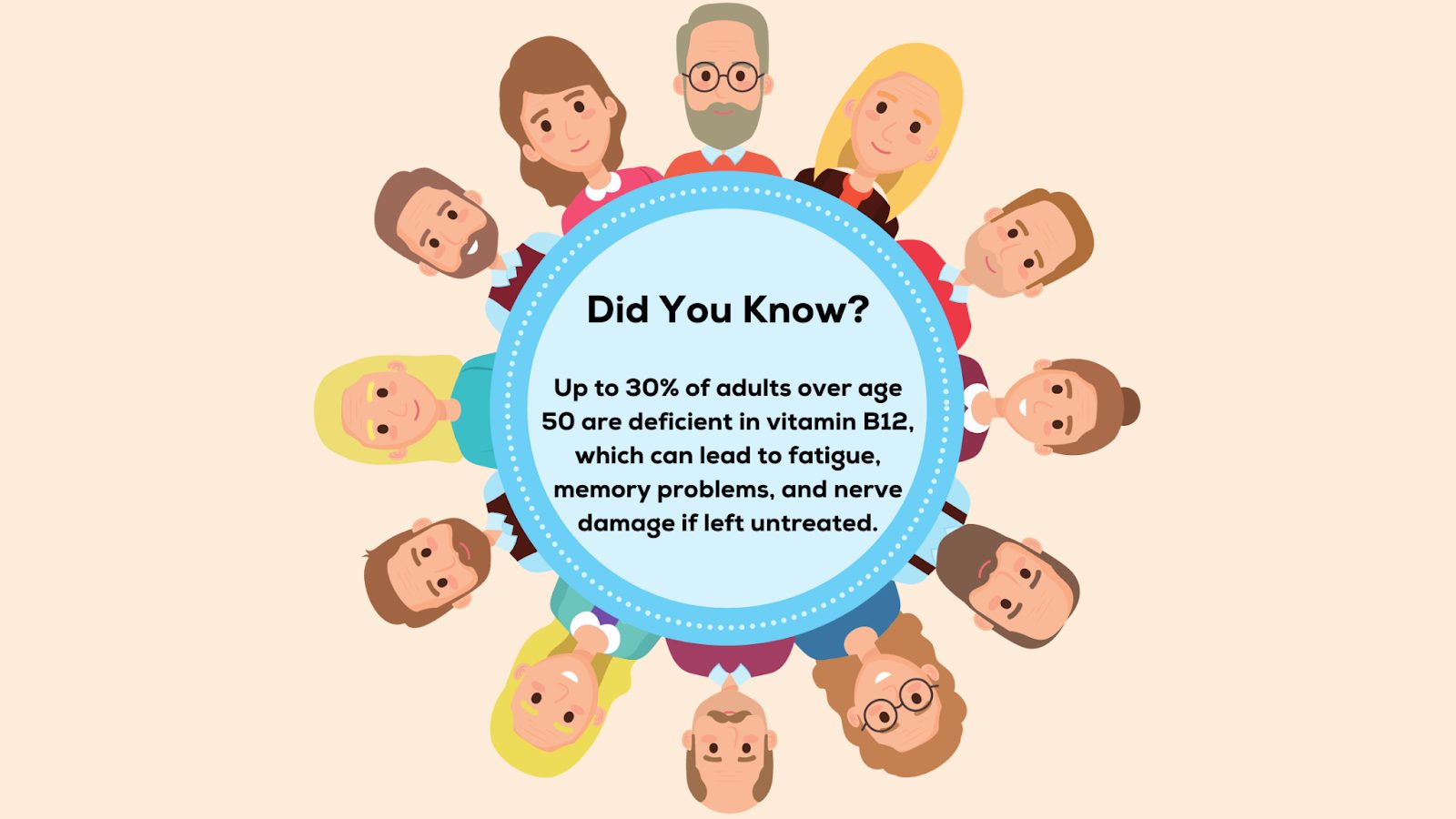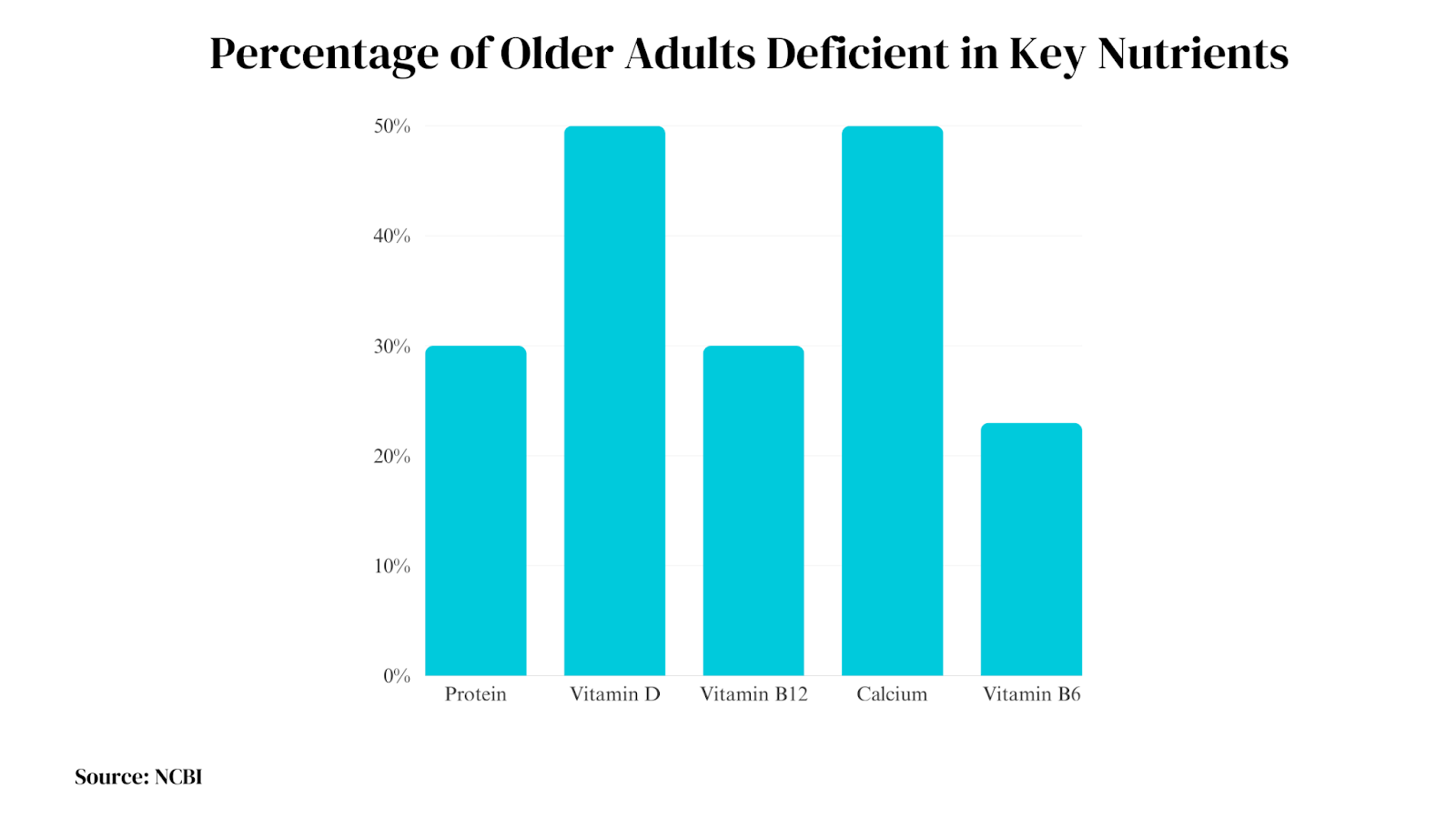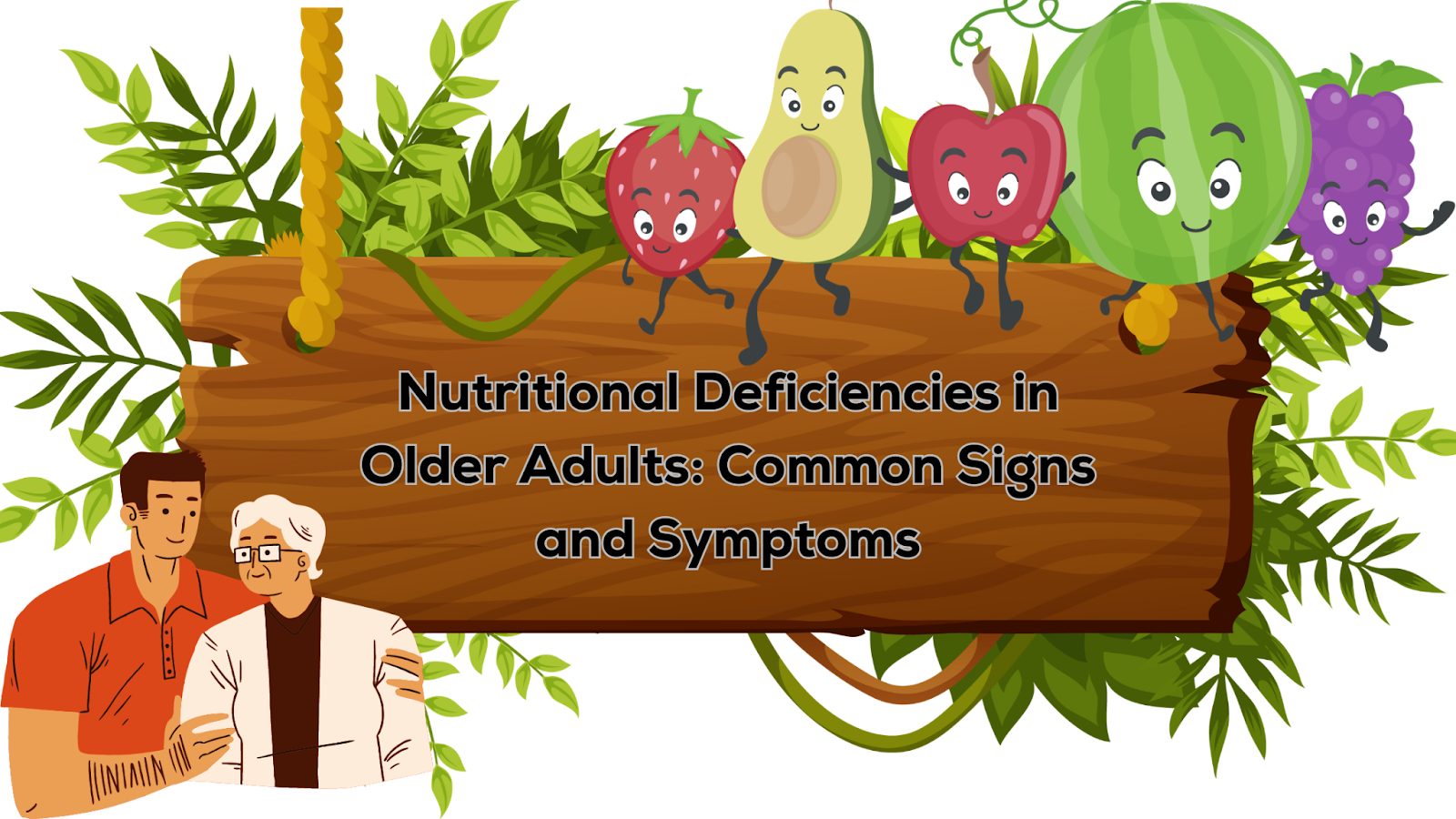Nutrition is important at every stage of life. However, as we age, our nutritional needs change and certain deficiencies become more common. Malnutrition in older adults poses a significant concern, with studies estimating that the risk of deficiency varies from 5% to 85% among seniors, depending on the population studied.
Detecting and correcting nutritional deficiencies in the elderly can greatly improve overall health, quality of life, and the ability to fight off illness and disease. This article will examine some of the most common nutritional deficiencies seen in aging populations, along with the signs, symptoms, and solutions for each.
Why Nutrition Matters as We Age
As we grow older, numerous physiological changes occur that affect nutrient absorption and nutritional status:
- Reduced appetite and food intake.
- Impaired nutrient absorption.
- Changes in body composition and bone mass.
- Chronic diseases and conditions, such as heart disease and diabetes, necessitate the diligent care and expertise of adult primary healthcare providers.
- Side effects of medications.
These factors put seniors at increased risk for malnutrition. Deficiencies in protein, vitamins, and minerals are especially common and can lead to weakened bones and muscles, impaired immune function, fatigue, frequent infections, poor wound healing, and more.
Sufficient intake of high-quality nutrition helps counteract age-related physiological decline. Key nutrients support energy, mobility, cognition, eye health, immune function, heart health, and more. The right diet can truly help seniors continue thriving in their later years.
Common Nutritional Deficiencies in the Elderly
While every individual is different, there are key nutrients that seniors are more likely to lack based on age-related changes and chronic conditions. Some of the most common deficiencies include:
1. Protein
Protein is essential for maintaining muscle mass and strength. However, reduced appetite and impaired protein absorption mean many older adults do not consume enough high-quality protein.

One study found up to 30% of seniors over 70 are protein deficient. Symptoms include:
- Loss of muscle mass and weakness.
- Frequent falls or fractures.
- Slow wound healing
- Edema or swelling.
Increasing protein intake to 1.2-1.5 g/kg of body weight per day can help seniors maintain lean body mass and strength. High-protein foods include meat, poultry, fish, eggs, dairy, beans, nuts, and seeds. Spreading protein intake evenly throughout the day is optimal.
2. Vitamin D
Up to 50% of older adults are deficient in vitamin D, also known as the “sunshine vitamin”. Vitamin D promotes calcium absorption and bone health. Deficiency is linked to weak bones, osteoporosis, impaired muscle function, and even depression.
Contributing factors include:
- Less efficient vitamin D absorption.
- Reduced sun exposure.
- Some medications.
Symptoms of vitamin D deficiency include:
- Bone loss and frequent fractures.
- Muscle weakness and pain.
- Impaired balance and coordination.
Seniors should aim for 600-800 IU of vitamin D per day from food sources like fatty fish, egg yolks, fortified milk, and supplements. Safe sun exposure also boosts vitamin D levels.
3. Vitamin B12
Vitamin B12 plays a key role in red blood cell formation, neurological function, DNA synthesis, and energy metabolism. However, up to 30% of people over 50 are deficient in B12 as absorption declines with age.

Contributing factors include:
- Gastric conditions affecting absorption.
- Vegetarian/vegan diets are low in animal products.
Symptoms of B12 deficiency include:
- Fatigue.
- Memory problems and confusion.
- Numbness or tingling.
- Difficulty walking.
Seniors should aim to consume 2.4 mcg of B12 per day from sources such as animal foods, fortified products, or supplements. Individuals with absorption issues may require regular B12 injections.
4. Calcium
Calcium is crucial for maintaining bone density. However, low calorie intake along with impaired vitamin D and calcium absorption puts many seniors at risk for deficiency.

More than 50% of adults over 50 don’t meet their calcium needs. Symptoms include:
- Osteoporosis and frequent fractures.
- Tooth loss.
- Muscle cramps.
Seniors should aim for at least 1200 mg per day of calcium from dairy, leafy greens, calcium-fortified foods, or supplements. Vitamin D improves calcium absorption.
5. Vitamin B6
Vitamin B6 supports the nervous and immune systems. Deficiency is linked to impaired cognitive function and immunity in the elderly. Up to 23% of older adults may have inadequate B6 levels.
Contributing factors include:
- Reduced food intake.
- Impaired absorption.
- Alcohol consumption.
- Certain medications.
Symptoms of B6 deficiency include:
- Weakened immune function
- Confusion, depression and irritability
- Skin rashes or ulcers.
Seniors should aim for 1.7 mg per day from poultry, fish, potatoes, bananas, fortified cereals, and supplements if needed.

Preventing Nutritional Deficiencies
The key to avoiding deficiencies is meeting increased nutritional needs through a healthy diet, supplements, and making lifestyle adjustments:
- Eat a balanced diet:
Maintain a balanced diet by focusing on nutrient-dense whole foods such as vegetables, fruits, whole grains, lean proteins, low-fat dairy, eggs, nuts, seeds, and legumes.
- Know your calorie needs:
Most older men need 2,000-2,400 calories per day. Older women need 1,600-2,000 calories per day. Under-eating leads to deficiency.
- Eat vitamin/mineral-rich foods:
Include citrus, berries, leafy greens, sweet potatoes, tomatoes, salmon, tuna, eggs, mushrooms, nuts, beans, and whole grains.
- Consider supplements:
Discuss supplements with your doctor, especially for vitamin D, calcium, and B12. Choose quality brands.
- Get sunlight:
Aim for 10-15 minutes per day to boost vitamin D.
- Stay active:
Exercise improves nutrient absorption and appetite. Aim for 150 minutes per week.
- Discuss medications:
Some prescriptions impact nutrient levels. Ask your doctor.
- Get regular checkups:
Doctors can check your nutritional status via bloodwork if concerned.
Proper nutrition helps seniors stay mentally sharp, mobile, resilient, and able to enjoy their golden years. Malnutrition can largely be prevented through healthy eating, an active lifestyle, and nutrient monitoring. Discuss your diet with your doctor and make nutrition a priority for lifelong health.
FAQs
What foods are high in protein for seniors?
Some great high-protein foods for seniors include lean meats, poultry, fish, eggs, milk, yogurt, cheese, beans, lentils, nuts, seeds, and nut butter.
How can you tell if an elderly person is malnourished?
Signs of malnutrition include unintentional weight loss, loss of muscle mass, fatigue, weakness, frequent infections or illnesses, poor wound healing, trouble concentrating, irritability, and a lack of appetite.
What vitamin supplements should seniors take?
Common supplements for seniors include a multivitamin, vitamin D, calcium, vitamin B12, and omega-3s. Check with your doctor first before starting any new supplements.
How can you get seniors to eat more protein?
Add protein foods like eggs, Greek yogurt, milk, cheese, beans, or nut butter to meals and snacks. Make smoothies with protein powder. Serve smaller, more frequent meals. Use nutrient-rich sauces and dressings.
What mineral deficiencies are common in the elderly?
Calcium, iron, magnesium, zinc, and selenium deficiencies are more likely in seniors. Focus on foods like dairy, leafy greens, meat, seafood, nuts, and legumes to obtain these minerals.
Conclusion
Aging brings about numerous changes that can impact nutritional status and increase the risk of deficiencies. However, with awareness of common deficient nutrients, a focus on whole foods and balanced eating, supplements when needed, and healthy lifestyle habits, seniors can meet their unique nutritional needs.
Monitoring intake and undergoing regular checkups allow for the early detection and correction of any deficiencies. Proper nutrition helps aging individuals continue thriving, while malnutrition accelerates decline.
By making nutrition a priority, older adults can support their health, independence, and quality of life well into their golden years.


